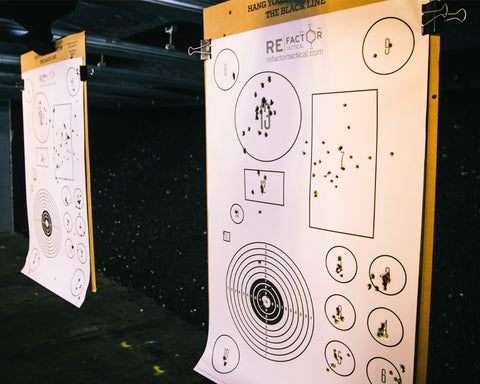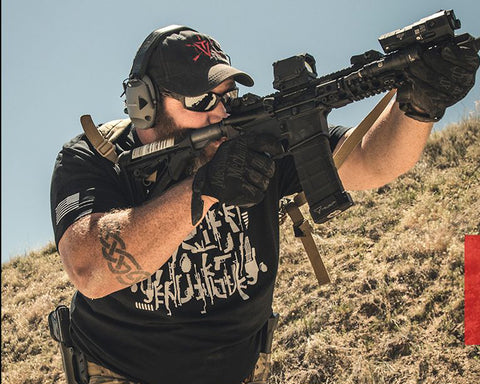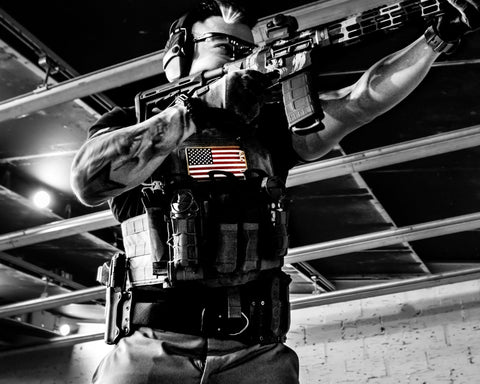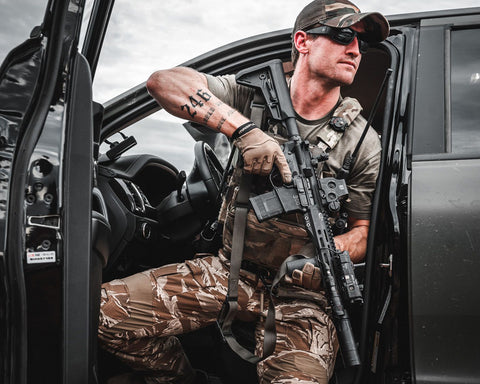Winchester Black Talon bullets were released by Winchester and debuted at SHOT Show in 1991.
Unfortunately, Winchester stopped producing Black Talon ammunition in 2000, which only fed into its mystique.

Are Black Talon Bullets armor-piercing? A common misconception was that it was produced with a black Teflon coating. Not true. In all actuality, it was a special black coating with the purpose of preserving barrel life.
And no, these rounds were not armor-piercing, despite what urban legend says.
Summary of Black Talon Alternatives
| Remington Gold Saber | Available at Kentucky Gun Company for $31.77/box |
| Speer Gold Dot (our favorite) | Available at Kentucky Gun Company for $31.53/box |
| Hornady Critical Duty | Available at Kentucky Gun Company for $34.99/box |
| Federal HST | Available at Kentucky Gun Company for $30.88/box |
| HOP Munitions 45 Auto | Available at HOP Munitions for $15.99/box |
Why The FBI Requested Better Duty Ammunition
The Winchester Black Talon was the answer for a more effective hollow point duty round demanded by the FBI following the 1986 Miami, FL shootout.
In the shootout, the eight FBI agents were mainly armed with Smith & Wesson Military and Police .357 Magnum revolvers shooting .38 Special +P ammunition.
The two bank robbers (William Matix and Michael Platt) were armed with a Ruger Mini 14 chambered in .223, 12 gauge shotguns, and .357 revolvers.
Despite being riddled with bullet holes from the FBI agents, Platt was able to continue firing back. At the end of a nearly five-minute shootout and over 140 rounds fired, five FBI agents were wounded and two (Jerry Dove and Benjamin Grogan) were killed.
The FBI agents had loaded jacketed hollow point bullets into their .357 Magnum revolvers. However, after medical examiners performed autopsies on the bodies, it was discovered that one bullet stopped just less than an inch from the heart. John Hall, the FBI Firearms Training Unit Director at the time called the tragedy "an ammo failure".
As a result, the FBI began the search for a more capable sidearm and more effective ammunition. The after-action report of the shootout also set a new precedence for the protocol on ammunition evaluation and testing.
For ammunition to pass the FBI Test Protocol, it must meet a minimum of 12 inches of penetration in ballistics gelatin, but no more than 18 inches. Additionally, it must penetrate clothing including heavy jackets, denim, and leather.
Black Talon Design
The round is a traditional hollow point design, but with a reverse taper. The reverse taper refers to the bullet’s jacket being thicker at the tip than at the base. This enhances rigidity which allows the sharp "talons" to remain perpendicular to the wound path.
This is unlike traditional hollow point designs where the expanding jacket petals peel back almost completely behind the expanded mushroom shape.
What sets Black Talon bullets apart is their six sharp “talons" designed to unsheathe once inside the victim’s body, thus tearing the wound channel to pieces.
At the time, Winchester’s Black Talon was one of, if not the most effective hollow point duty round you could buy.
Why Was Black Talon Discontinued?
Two high-profile mass shootings in 1993 led to the demise of Winchester Black Talon ammunition. In December, Colin Ferguson killed six people and injured 19 more on a train in New York. He reportedly loaded his handgun with Black Talon rounds.
Seven months later, Gian Luigi Ferri loaded his gun with Black Talon ammunition and walked into a law office in San Francisco, California, killing nine people. Time Magazine described the Black Talon rounds as a bullet "designed to unsheathe its claws once inside the victim’s body and tear it to pieces." A surgeon in Houston said Black Talon rounds "explode inside a person like a thousand razor blades."
When a hollow point bullet hits a soft target, it expands to what looks like a flower with petals. This expansion creates a larger wound channel. When the Black Talon expanded, it resembled talons, essentially creating a massive wound channel. The larger the wound channel the more likely the threat will drop quicker.
In fact, for the first two years, Black Talon was on the market it received an award from Shooting Industry magazine for its effective lethality.
Are Black Talon Bullets Illegal
Black Talon bullets are not inherently illegal in the United States. Black Talon bullets are a brand of hollow-point bullets that were designed and marketed by Winchester in the 1990s.
In 1993, the Black Talon bullet gained notoriety after it was used by a gunman in a mass shooting in a California law office. The publicity around the shooting led to some jurisdictions restricting the use of Black Talon bullets, but they were not banned outright.
Today, Black Talon bullets are no longer manufactured or sold by Winchester, but similar types of hollow-point bullets are still widely available and legal for civilian use in the United States.
Winchester Black Talon Alternatives
Nowadays, people still claim Black Talon was the best defensive handgun round. Even though it can be found on sites like GunBroker for a premium, people are still in search of a modern-day equivalent.
HOP Munitions 45 Auto
The 230gr JHP manufactured by HOP Munitions results in a slightly slower FPS of 876 FPS but offers a greater downrange energy of 392 ft/lbs. This round is an excellent choice for self-defense or home defense.













Leave a Reply
Your email address will not be published. Required fields are marked *